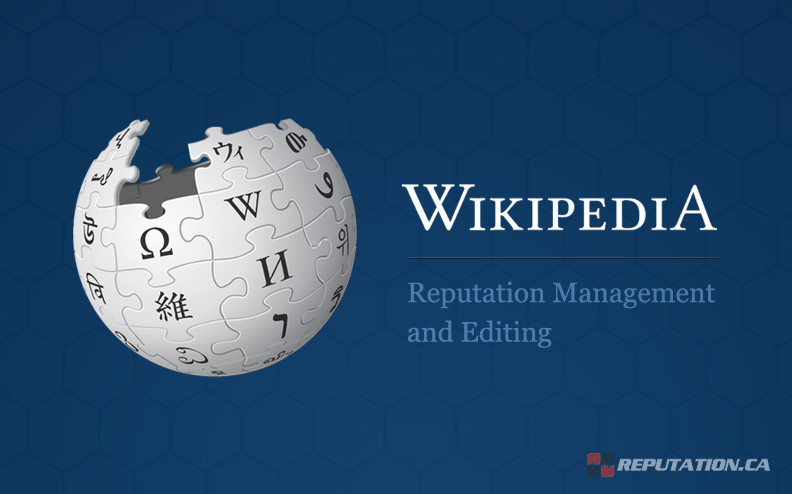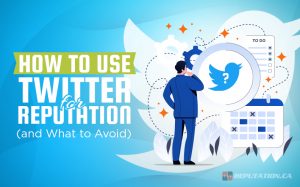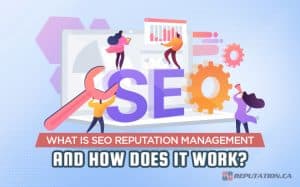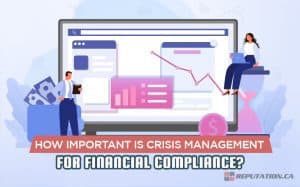Wikipedia is one of the most popular and most visited sites in the world, ranking #8, behind only giants like Google, YouTube, and Amazon. It’s also a great source of information about just about any topic, with as much of a guarantee of factuality as you can get online. Despite being a community-edited website, it focuses on verifiable facts and unbiased coverage, making it an excellent tool for managing a reputation. There’s just one problem; Wikipedia knows this, and they’re very vigilant when it comes to stopping transparent attempts at reputation management. You can’t use your Wikipedia entry as a propaganda piece – it will either be removed, be edited for more factuality, or be edited to reflect your attempts. This level of overview, editing, and pruning is what makes Wikipedia the authority it is. Google trusts them, which is why a Wikipedia article shows up in over 90% of all Google searches. Why wouldn’t you want a piece of the pie?
Can You Use Wikipedia?
If you’re a business owner and you want to use Wikipedia to help manage your company’s reputation, it’s possible, but there are a lot of roadblocks in the way. 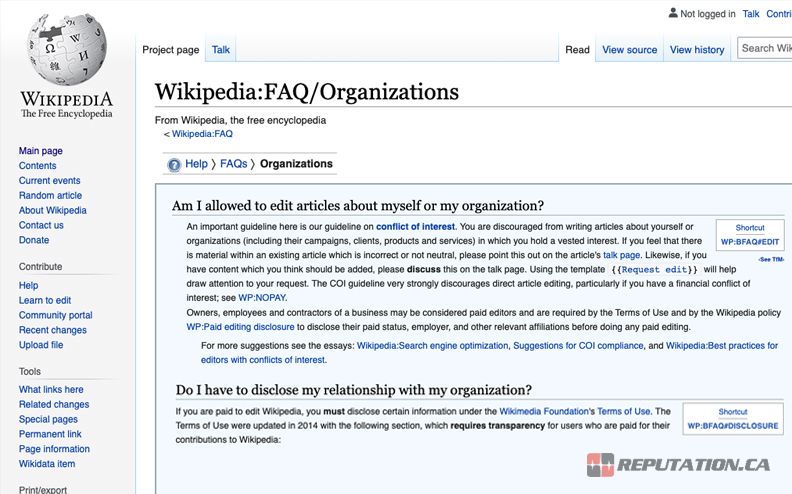 You can only really use Wikipedia if all of the following are met:
You can only really use Wikipedia if all of the following are met:
- You intend to spread factual information about your business, to combat misinformation.
- You’re capable of writing in a factual, unbiased way.
- You have numerous sources that back up the information you write, that aren’t sources you control.
- Your business is at least minimally noteworthy.
It’s also worth mentioning that Wikipedia has rules in place against creating or editing your own Wikipedia entry. Specifically, in their FAQ for businesses, they say this:
“You are discouraged from writing articles about yourself or organizations (including their campaigns, clients, products, and services) in which you hold a vested interest.”
This falls under their conflict of interest guidelines. You can request an edit if there’s a factual inconsistency, and you can attempt to publish an unbiased article with transparency, but you will always run the risk of being disregarded out of hand. Incidentally, it’s a very good idea to click through to that FAQ and read it top to bottom. You might learn a few things that discourage you from using Wikipedia to manage your reputation; that’s the intended purpose of the document. We can look at each of these hurdles in greater detail, to explain how Wikipedia works and how you can (or can’t) use it for your business purposes.
Wikipedia Requires Factual Information
First of all, Wikipedia thrives on factual information. Whenever you read a Wikipedia article, about any subject, you’ll largely be reading a dry, factual paper about the subject. It might not be quite as bland as academic writing, but it’s about as far away from sales copy or a press release as possible. This is by design. Wikipedia is intended to be a bastion of factual information, a real encyclopedia to rival the print editions of encyclopedias. It’s a massive undertaking, with thousands of editors keeping tabs on various sections to enforce factuality. Of course, Wikipedia editors are not always correct. Now and then, a scandal – or “scandal”, given how low-profile some of them are – will appear. For example: 1. The case of one user’s campaign to remove a grammatical error that isn’t an error. 2. The case of the Scots language version of Wikipedia being created largely by someone who doesn’t know the language. The fact is, Wikipedia has a lot of contributors and a lot of experts, but these two don’t always overlap. They strive to publish only facts, but those facts are only verified by what sources they can find, and the expertise of the editors. 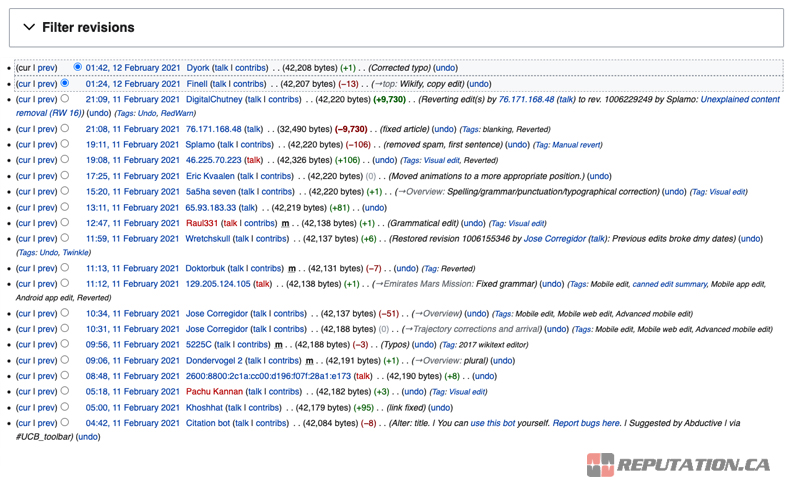 Unfortunately, this doesn’t help you, as a business. There are a lot of editors who are very familiar with businesses, commerce, and specifically English-language business operations. You’re in a high-scrutiny area and need to make sure everything you present is factual to pass the test. What this means is that when you create or edit your own Wikipedia article, you need to be as unbiased and as factual as possible. Otherwise, your edit can be reverted, or worse, your page can draw scrutiny and be removed entirely if it doesn’t pass muster.
Unfortunately, this doesn’t help you, as a business. There are a lot of editors who are very familiar with businesses, commerce, and specifically English-language business operations. You’re in a high-scrutiny area and need to make sure everything you present is factual to pass the test. What this means is that when you create or edit your own Wikipedia article, you need to be as unbiased and as factual as possible. Otherwise, your edit can be reverted, or worse, your page can draw scrutiny and be removed entirely if it doesn’t pass muster.
Wikipedia Requires Unbiased Presentation
Take a look at a business page on Wikipedia, something like the Walt Disney Company. What do you see? The introduction and summary is a factual history of the brand. The corporate history is factual, with bullet points listing noteworthy eras and actions. Other sections include financial histories, executive management lists, and key business information. 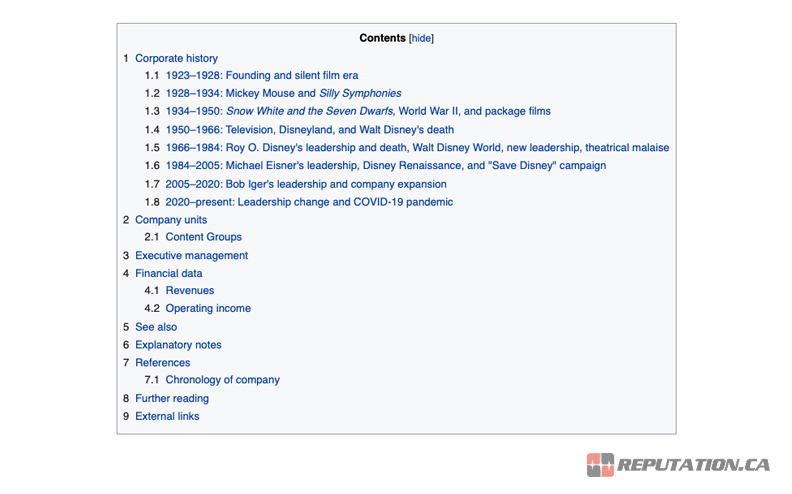 What do you not see? You don’t see any reporting about Disney scandals. You don’t see any biased information about the quality of executive leadership, past or present. You don’t see mention of the performance of various divisions. It’s simple facts. If any company in the world could put pressure on Wikipedia to publish a biased article, it would be Disney, and yet their article is factual. Sure, it doesn’t have a “controversy and scandals” section like many celebrities do, but that’s not unusual; for a company the size of Disney, that could be an article of its own. A smaller example might be MyPillow, the American pillow company that has been in the news recently for its political activities. Even then, the company is noteworthy enough for those activities to create a Wikipedia page, but that page fully represents the company, including both its philanthropic actions and its political actions, good and bad. Again: it’s factual and unbiased. The article isn’t deleted because a political group doesn’t like the company, nor is it written with glowing praise because another political group supports it. The page is neutral, factual, and about the company.
What do you not see? You don’t see any reporting about Disney scandals. You don’t see any biased information about the quality of executive leadership, past or present. You don’t see mention of the performance of various divisions. It’s simple facts. If any company in the world could put pressure on Wikipedia to publish a biased article, it would be Disney, and yet their article is factual. Sure, it doesn’t have a “controversy and scandals” section like many celebrities do, but that’s not unusual; for a company the size of Disney, that could be an article of its own. A smaller example might be MyPillow, the American pillow company that has been in the news recently for its political activities. Even then, the company is noteworthy enough for those activities to create a Wikipedia page, but that page fully represents the company, including both its philanthropic actions and its political actions, good and bad. Again: it’s factual and unbiased. The article isn’t deleted because a political group doesn’t like the company, nor is it written with glowing praise because another political group supports it. The page is neutral, factual, and about the company. 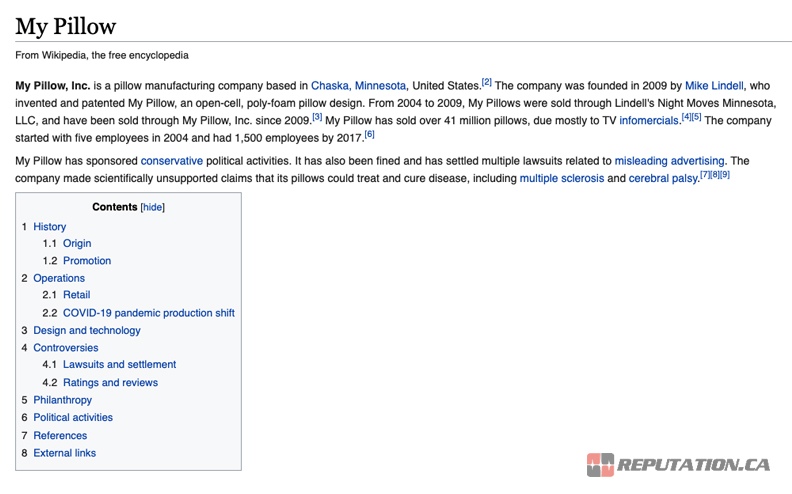 This is what you’re up against. If your company is trying to recover from a public relations disaster, a bad product launch, or some negative remarks made by a now-fired CEO, a Wikipedia page isn’t the answer, because that page will cite and reference those events. You can’t use Wikipedia as a press release to sanitize your reputation.
This is what you’re up against. If your company is trying to recover from a public relations disaster, a bad product launch, or some negative remarks made by a now-fired CEO, a Wikipedia page isn’t the answer, because that page will cite and reference those events. You can’t use Wikipedia as a press release to sanitize your reputation.
Wikipedia Requires Sources
One of the biggest roadblocks to a business getting a Wikipedia page is the need to source all of the information on the page. Every Wikipedia page you see has a copious list of footnotes, typically links to informational databases, public records, news stories, documentary coverage, and other verifiable sources of fact. What you don’t see are links to company websites, to company-owned media properties, or to press releases from the company. These are considered biased sources of information, and as such, they aren’t viable sources. 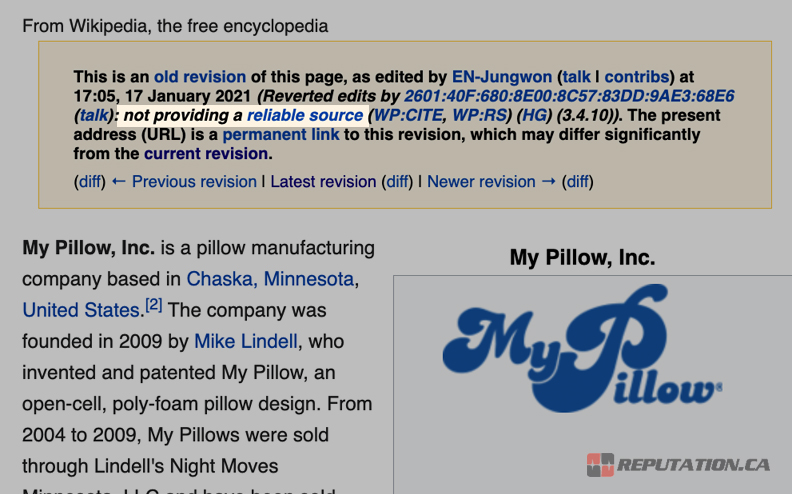 Many company Wikipedia pages are removed for not having enough factual grounds for an article. The fact is, if your company doesn’t have enough coverage, it probably isn’t going to pass the final hurdle anyway.
Many company Wikipedia pages are removed for not having enough factual grounds for an article. The fact is, if your company doesn’t have enough coverage, it probably isn’t going to pass the final hurdle anyway.
Wikipedia Requires a Noteworthy Subject
The final hurdle, and the steepest one to surpass, is the GNG, or General Notability Guidelines. These guidelines apply to every topic. There are millions of identified asteroids in the sky, but the vast majority of them are not noteworthy enough to have their articles. The same goes for companies; the vast majority of small and even mid-sized businesses aren’t noteworthy enough to have their pages. 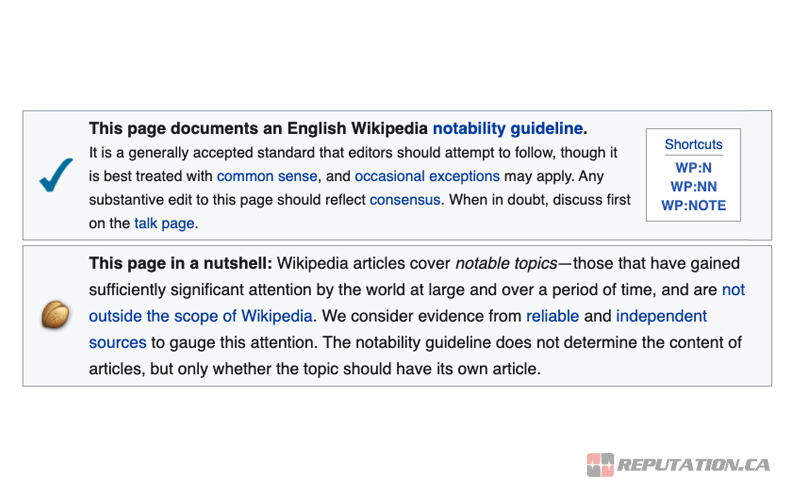 The standards for what makes a business noteworthy enough for inclusion are very high. MyPillow makes it because of its high-profile role in United States politics and the controversy surrounding them. Large companies often don’t; marketing giants Moz and Backlinko don’t have pages, Neil Patel doesn’t have a page despite being a high-profile entrepreneur, and so on. Despite being noteworthy within their sphere of influence, they’re subject to very high standards for what is worth having a page on Wikipedia. Perhaps the most important document you can read is What Wikipedia Is Not. It’s a list of things Wikipedia isn’t and can help you see exactly why a business page may not be noteworthy enough to exist. In particular: 1. Wikipedia is not a means of promotion. 2. Wikipedia is not a directory. 3. Wikipedia is not an indiscriminate collector of information. Just because your company exists, even if you’ve been in the news, doesn’t mean you’re noteworthy enough to have a page.
The standards for what makes a business noteworthy enough for inclusion are very high. MyPillow makes it because of its high-profile role in United States politics and the controversy surrounding them. Large companies often don’t; marketing giants Moz and Backlinko don’t have pages, Neil Patel doesn’t have a page despite being a high-profile entrepreneur, and so on. Despite being noteworthy within their sphere of influence, they’re subject to very high standards for what is worth having a page on Wikipedia. Perhaps the most important document you can read is What Wikipedia Is Not. It’s a list of things Wikipedia isn’t and can help you see exactly why a business page may not be noteworthy enough to exist. In particular: 1. Wikipedia is not a means of promotion. 2. Wikipedia is not a directory. 3. Wikipedia is not an indiscriminate collector of information. Just because your company exists, even if you’ve been in the news, doesn’t mean you’re noteworthy enough to have a page.
Creating or Editing Your Page
If you don’t already have a Wikipedia page, it’s likely going to be very difficult to make one, especially if you’re currently in the news because of a PR scandal or disaster. Wikipedia editors are aware of the use of the site for reputation management and will check the current state of a topic before it’s added. Your best bet is to try to add a Wikipedia page when there isn’t negative press or when there isn’t anything particularly noteworthy going on. 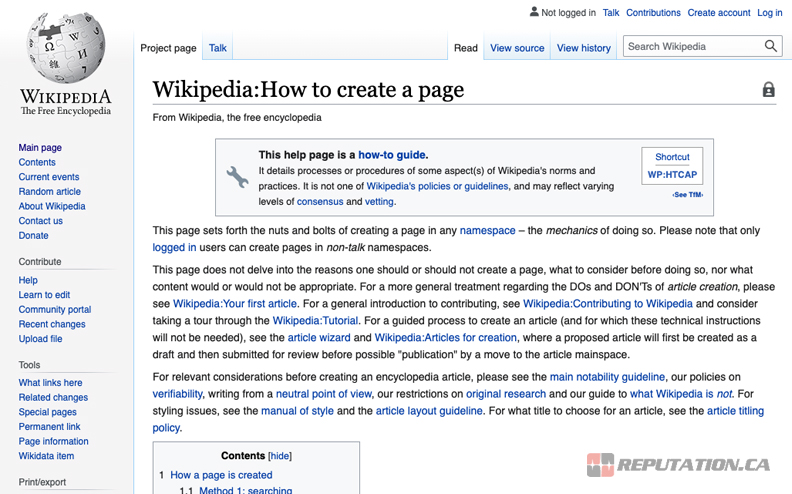 If you already have a Wikipedia page, it’s easier to get edits in, but you need to remain factual and unbiased. Adding a whole new section for “refuting allegations” or something is going to backfire spectacularly. So will deleting a “controversy” section, especially if there’s valuable information in that section. A lot of this, though, is played by ear. One of the best things you can do is establish yourself as a Wikipedia contributor long before you touch your company page. Make edits (factually) for other pages and company pages within your industry, and build up a history of contributing. Only then should you attempt to build up a page for your company.
If you already have a Wikipedia page, it’s easier to get edits in, but you need to remain factual and unbiased. Adding a whole new section for “refuting allegations” or something is going to backfire spectacularly. So will deleting a “controversy” section, especially if there’s valuable information in that section. A lot of this, though, is played by ear. One of the best things you can do is establish yourself as a Wikipedia contributor long before you touch your company page. Make edits (factually) for other pages and company pages within your industry, and build up a history of contributing. Only then should you attempt to build up a page for your company.
Using Wikipedia for Reputation Management
Unfortunately, none of this helps you deal with an immediate crisis. Wikipedia is a terrible choice for PR disasters and other immediate crises. It’s good for long-term information and reputation building, and that’s exactly what you should use it for. This is very much not something you can do on your own, 99% of the time. You need someone who knows reputation management and, more importantly, has an established history as a Wikipedia editor and contributor. 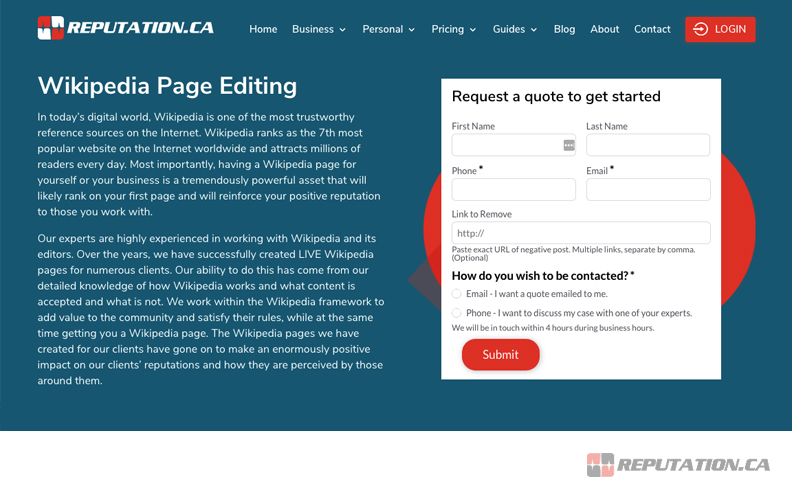 The only real case where short-term reputation management to address a disaster or crisis is viable on Wikipedia is if someone has created or edited your page to misrepresent or vandalize your page. In that case, establishing facts and removing misinformation is a public service. While this post might make it sound like Wikipedia isn’t a viable option, the truth is, it’s simply a high-value target. Anything worth getting is worth fighting for. The value of having a Wikipedia article is extremely high, and so the care you need to take in establishing it is equally high.
The only real case where short-term reputation management to address a disaster or crisis is viable on Wikipedia is if someone has created or edited your page to misrepresent or vandalize your page. In that case, establishing facts and removing misinformation is a public service. While this post might make it sound like Wikipedia isn’t a viable option, the truth is, it’s simply a high-value target. Anything worth getting is worth fighting for. The value of having a Wikipedia article is extremely high, and so the care you need to take in establishing it is equally high.




